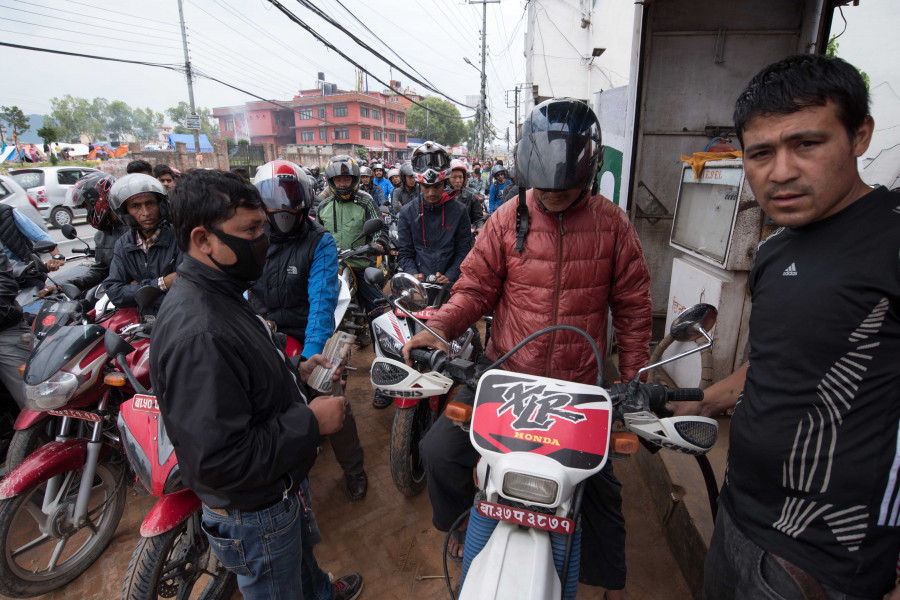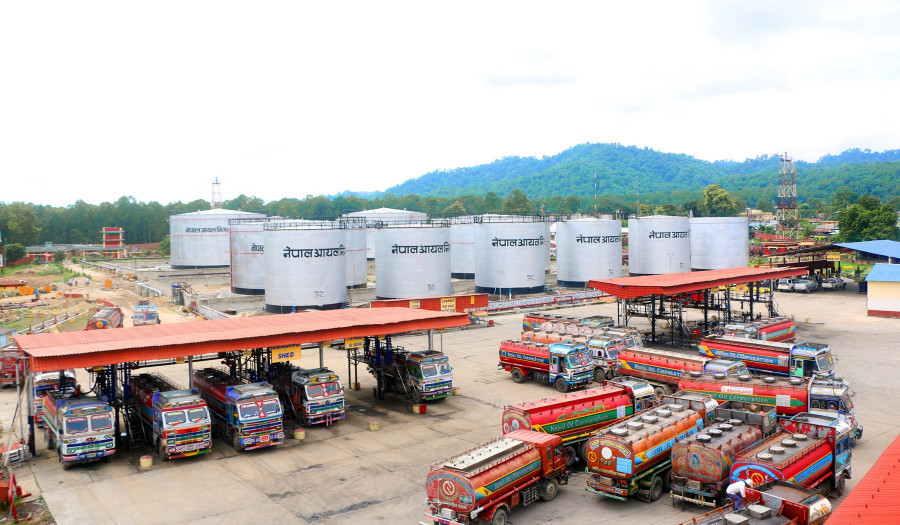Money
Higher fuel taxes will hasten move to green energy, World Bank says
Nepal Oil Corporation currently sells petrol at a record high price of Rs160 per litre, out of which more than Rs60 goes to the government in taxes.
Krishana Prasain
While calls are growing to give the Nepali people a break by cutting fuel taxes as they struggle to get back to their lives after the trauma of the pandemic, the World Bank has recommended a policy reversal to hasten the move to green energy: Remove subsidies and tax fuel.
“This would provide fiscal space in South Asian countries and trigger an energy transition towards cleaner and more renewable forms of energy,” the World Bank said in a report entitled "Reshaping Norms: A New Way Forward".
High and volatile oil prices have exposed South Asia’s vulnerabilities and underscored the need to become less dependent on fossil-fuel imports, the multilateral funding agency said in its report published on April 13.
The dependence on fossil fuels causes, apart from economic problems, environmental damage, which in turn has a negative impact on the economy.
“High and volatile oil prices have exposed South Asia’s balance-of-payments vulnerabilities and fiscal challenges. Rising oil prices, further pushed up by the war in Ukraine, sharply increased the import bill for most countries in South Asia, which is posing new challenges to financing current account deficits,” the report said.
“And as many governments in South Asia use subsidies to keep consumer energy prices low, rising oil prices in international markets impose further strain on fiscal balances,” according to the report.
Nepal Oil Corporation has set the price of petrol at a record high of Rs160 per litre, out of which more than Rs60 goes to the government in taxes.
A cost breakdown shows that the cost of petrol is Rs178.16 per litre when it reaches Kathmandu. The state-owned monopoly sells it at the retail price of Rs160 per litre, incurring a loss of Rs18 on every litre sold.
Some economists say that higher taxes on fuel means people will use less of it, leading to increased savings.
Nepal's oil import bill reached an all-time high of Rs257 billion in the third quarter of the current fiscal year ending mid-July.
The rise in fuel prices has angered consumers.
High fuel prices are painful not only for the public but also the government because more foreign currency is going out and it has to spend more on subsidies.

But cutting taxes on fuel also means a drastic reduction in government revenue.
Recently, the central bank urged the government to slash petroleum imports to stem the outflow of foreign exchange.
The World Bank said that from a socioeconomic perspective, it is important to become less dependent on fossil fuels.
“This can be done by taxing, rather than subsidising, carbon-intensive fossil fuels,” the report said. “Such taxation would provide incentives for higher energy efficiency and encourage the transition towards renewable energy.”
Air pollution is one of the key negative side effects of the burning of fossil fuels in South Asia. And the burning of fossil fuels obviously also contributes to climate change, the report said.
The taxation of negative environmental consequences, or the greening of taxation, can help raise significant government revenues, and is an integral part of other green fiscal instruments such as green public infrastructure in South Asian nations, the report said.
According to the Department of Customs, Nepal imported petroleum products worth Rs257 billion in the first nine months of the fiscal year–until mid-April.
The government collected Rs94 billion in tax revenue from the import of petroleum products during the review period.
In the last fiscal year, Nepal’s oil import bill amounted to Rs214.40 billion, up from Rs194.79 billion in the previous fiscal year 2019-20.
Fuel imports were worth Rs253.99 billion in the fiscal 2018-19 and Rs197.85 billion in the fiscal 2017-18. Nepal imported petroleum products worth Rs140 billion in the fiscal year 2016-17.
In the fiscal year 2015-16, imports were valued at Rs85.10 billion, the sharp drop a result of India’s trade blockade when shipments slowed to a trickle. Nepal imported petroleum products worth Rs126.56 billion in fiscal 2014-15.
Prakash Kumar Shrestha, executive director of the Economic Research Department at the Nepal Rastra Bank, says removing subsidies on fuel is a good option at a time when there is pressure on the balance of payments.
“We need to think about substitution as we cannot keep importing oil and selling it at a subsidised rate. Consumption has increased by leaps and bounds, and the country cannot just subsidise it,” he said.
“Obviously, removing subsidies on fuel will put pressure on prices. But it will affect only a certain group. The government can give subsidies to targeted groups,” Shrestha said.
“The subsidy is currently being enjoyed by all levels—from the middle class to rich people.”
The World Bank said that well-designed programmes of targeted support to vulnerable households can be much more cost-effective than blunt energy subsidies, which tend to benefit richer households in absolute terms.
“Tax needs to be imposed on overall fossil fuel, and it should not be subsidised because most of it is used by richer people,” said Bhushan Tuladhar, an environmentalist.
"But while taxing fossil fuels, everyone should not be put in the same basket. Since diesel is related to becoming the key cause for inflation, the government should think differently about subsidising transport that carries goods and the public," Tuladhar said.
“In the case of our country, we have other sources of renewable energy like electricity and solar power. Subsidies should be granted to renewable energy and tax must be imposed on fossil fuels.”
Economist Bishwambher Pyakuryal too says removing subsidies on fuel, which is the key source of government revenue, is appropriate at the current moment.
"The time has come to remove subsidies on fuel and fully tax it," he said. “But since Nepal is largely dependent on imported goods, removing subsidies will boost inflation in food and non-food further. That’s a major challenge for the government.”




 9.89°C Kathmandu
9.89°C Kathmandu















